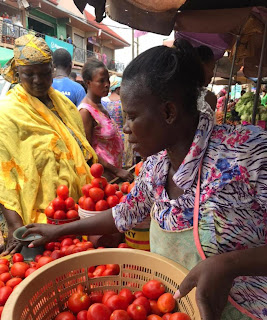By John W. Fountain
ACCRA. CAPITAL CITY. POPULATION 2.6 MILLION. Forty journalism students, one goal: To tell the stories of everyday people. From its bustling boisterous markets. To the relentless entrepreneurial merchants who hawk their wares in perilous streets that buzz with motorists and merciless motorbikes that dart recklessly between traffic. To the faithful “Kayaye”—the young women who work as head porters, carrying more than their weight on their heads and a small child tied in a cloth on their backs.
"The consensus around here is that whatever superlatives may be used to describe Ghana, one must also interject the word, 'hard.'"
This is their story. It is a story of the rhythms of life and in this time. The story of a people whose hardship alone is not enough to dissuade them from viewing life through the prism of possibility, even when sweat is dripping like raindrops from their brow, their backs aching from carrying their burdens in the heat of the day, their fingers stretched, their feet wearied and worn, and another day’s journey of toil for little pay awaiting at the light of each new sunrise.
 |
| A woman working as a head porter carries her load on her head a child in a cloth attached to her back. (Photo: John W. Fountain) |
There is another undeniable truth. It is as glaring as the inevitable suffocating traffic on the Spintex Road: That "freedom and justice," for many here in the humbling, hardscrabble streets of Accra, looks and feels a lot like, "freedom and just us." And it is apparent, they say, that no help is coming, at least no time soon.
“Ghana is hard,” they say. But the people of Accra are harder—more resilient than the poverty and lack that many face. Unbreakable in spirit and in determination.
This much is clear in their stories. Like the story of the young men who wander in search of scrap metal, lingering somewhere between homelessness and subsistence. The story of the mother who sells tomatoes in the market and ekes out a living for her family by her mastery.
The story of the young woman who has broken the unspoken barrier of becoming a lottery agent in a male-dominated world. The tale of the family for whom producing and selling kenkey is their pride and joy, like a daughter called Grace who leads the family charge.
"People of Accra" is a story in which it becomes apparent that perhaps some of the people in this world richest in faith and spirit are those poorest in substance. That socioeconomic circumstances cannot extinguish the joy, dignity and pride of a people. And that examining the world through the prism of everyday people, even the poor, is a worthwhile undertaking for both journalism's sake and democracy's.
 |
| Madam Salomey attending to a customer at Madina Market in Accra, Ghana. (Photo: Joanna Mawusi Dogbey) |
People of Accra. This is their story. Told through the eyes and pens of Ghanaian students enrolled during spring 2022 in a journalism course at the University of Ghana-Legon. It is a human story. A story about Africa and Africans told, not by outsiders looking in, but by insiders with the insight, sensitivity and ability to tell those stories accurately and incisively.
People of Accra: A Portrait In Time. It is an important story. Our Story. A story we can all share.
Project by journalism students at the University of Ghana-Legon and John W. Fountain. Project edited and produced by John W. Fountain
 |
Evangelist Gladys Tetteh poses in front of a market stall with her last child asleep on her back. (Photo: Michael Etrue) |
CONTRIBUTORS:
Adelaide Ayeaku Birikorang; Dillon Owusu Brown; Dina Okyerebea; Elorm Kofi Deh; Emmanuel Ako-Gyima; Emmanuella Amoafo Asante; Enid Araba AsamoahErnest Boakye Duodu; Frank Asiedu; Gertrude Oforiwaa Brako; Gifty Aboagye-Mensah; Hope Kwabena Akpabli; Jacob Tetteh; Joanna Mawusi Dogbey; John Kofi Dorgbefu; John Yaw Asare; Josephine Awuku; Joy Sena Anku; Juliana Kwofie; Juliet Takyiwaa Nyamekye; Lucy Ackah; Maame Efua Yamoawah Essel; Michael Etrue; Michele Dede Quarcoo; Mildred Songsore Salia; Nana Ama Hayfron; Nana Boakyewa Frempong; Nihad Suhuyini Sayibu; Philip Edwin Ansah; Rees Oduro Hakeem; Reward Feehi Kpokli; Salma Gifty Braimah; Samuel Kofi Kilinfingh; Samuel Terkpeh Otoo;Samuella Naa Oyoe Quartey; Sarah Pomaah; Shafiulahi Ibrahim; Theodora Mawufemor Aku Agbodeka; Theophilus Degenu Smith


